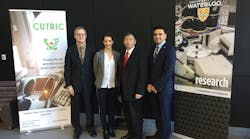Mississauga’s MiWay to partner with CUTRIC on hydrogen fuel-cell electric bus pilot in 2021
MiWay, the city of Mississauga’s public transit system, will partner with the Canadian Urban Transit Research & Innovation Consortium (CUTRIC) on a hydrogen fuel-cell electric bus pilot project in 2021.
The pilot project will help the city evaluate how hydrogen-electric technology can help advance its commitment to a zero-emission bus fleet in support of the Climate Change Action Plan. The Climate Change Action Plan outlines 21 actions to be taken over the next 10 years, including advancing sustainable transportation through low-carbon opportunities.
“A major priority for Mississauga is fulfilling the actions outlined in our Climate Change Action Plan. Participating in this pilot project will advance our understanding of sustainable transportation, helping us make sound decisions for our fleet in the future,” said Mississauga Mayor Bonnie Crombie. “At the city, we’re committed to looking for innovative and low-emissions solutions to reach our goal of reducing greenhouse gas emissions in Mississauga by 40 percent by 2030.”
The pilot project will happen in two phases. In the first phase, a feasibility study will be completed to understand four key components in applying the technology: local hydrogen fuel supply and storage; vehicle design and implementation logistics; economic and financial viability; and greenhouse gas reduction opportunities. This study will use CUTRIC’s RoutΣ.i™ physics-based simulation tool to predict the performance, operational costs and savings associated with hydrogen fuel-cell electric buses as part of a phased transition to full electrification at MiWay.
In the second phase, MiWay will work with CUTRIC to secure the required funding for the project through provincial and federal governments. The funding will allow the partnership to buy and operate 10 hydrogen fuel-cell electric buses, applying the knowledge acquired through the first phase.
“Taking part in the pilot program will help us learn how hydrogen fuel-cell electric bus technology will operate in MiWay’s fleet, particularly with the winter weather conditions and how it performs compared to battery-electric technology. This pilot is important and necessary to examine the feasibility of introducing this low-carbon technology into our fleet,” said Geoff Marinoff, director, Transit. “In addition to the hydrogen fuel-cell electric bus pilot, MiWay is already preparing to enter into service 11 hybrid-electric buses that are convertible to full battery power. MiWay is also conducting a Transit Electrification Study to understand battery-electric bus conversion opportunities. Based on all of these new and innovative technologies, MiWay will learn which technology is more efficient, affordable and will achieve the targets outlined in the Climate Change Action Plan.”
The hydrogen fuel-cell electric bus pilot is supported by C$45,000 (US$35,180) from the city of Mississauga and more than C$100,000 (US$78,180) from CUTRIC’s research funds. CUTRIC explains this project will be the most extensive of its kind in Canada and will see MiWay become the first transit agency in the country to conduct a full-fleet analysis of fuel-cell electric bus technologies for deployment in the near future.
“While many transit agencies in Canada are conducting small scale battery-electric bus trials, none of them currently involve hydrogen fuel-cell electric bus technology. This would make Mississauga the only city in Canada to undergo a pilot like this,” said Geoff Wright, commissioner, Transportation and Works. “Hydrogen fuel-cell electric bus technology offers the same benefits as the battery-electric bus technology; however, they are lighter and quieter, have more fuel capacity and can also deliver the critical operational benefits a transit system needs to serve customers in a practical way, particularly on longer distance routes.”
CUTRIC’s RoutΣ.i™ was developed and maintained by CUTRIC’s specialist team of geographic information system analysts, mathematicians, physicists, engineers and interdisciplinary project managers to predict fuel-cell electric vehicle and fleet range based on parameters such as fueling time, ridership levels, stopping and starting due to traffic lights and pedestrian crossings, total energy needs and costs, carbon dioxide reductions and fleet scheduling needs.
“The timing for this study is perfect given the federal government’s focus on electric and zero-emission vehicle deployments to combat climate change and given Ontario’s interest in pursuing a hydrogen strategy this year,” said CUTRIC President and CEO Josipa Petrunic. “By working with this innovative and forward-thinking municipality and region, we are removing the barriers of uncertainty and high risk associated with the adoption of electrified propulsion technologies. We’ll be able to help get quiet, enviro-friendly zero-emissions buses out on the roads in one of the most vibrant parts of this country and show that Canadians can lead in hydrogen bus innovation for a worldwide marketplace.”

Mischa Wanek-Libman | Group Editorial Director
Mischa Wanek-Libman is director of communications with Transdev North America. She has more than 20 years of experience working in the transportation industry covering construction projects, engineering challenges, transit and rail operations and best practices.
Wanek-Libman has held top editorial positions at freight rail and public transportation business-to-business publications including as editor-in-chief and editorial director of Mass Transit from 2018-2024. She has been recognized for editorial excellence through her individual work, as well as for collaborative content.
She is an active member of the American Public Transportation Association's Marketing and Communications Committee and served 14 years as a Board Observer on the National Railroad Construction and Maintenance Association (NRC) Board of Directors.
She is a graduate of Drake University in Des Moines, Iowa, where she earned a Bachelor of Arts degree in Journalism and Mass Communication.






